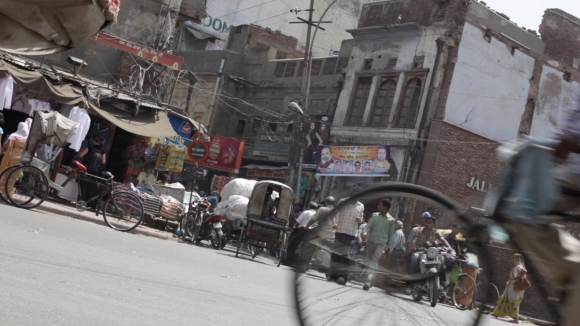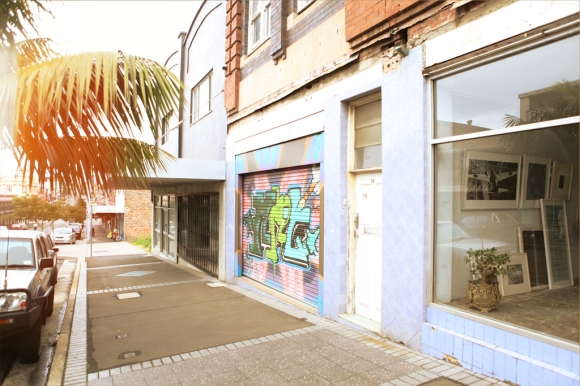Becca from Exile Fertility is a kindred spirit I have never met (but randomly, she knows my sister and brother-in-law from her time in Sudan). I love everything this girl has to say–her writing is slow, methodical, and transcends the internet hullabaloo. I feel like we live in somewhat similar situations, and I love her reflections on living in beautiful and broken places. I am so excited about this post (plus, I also grew up reading the book she mentions–kingdom nerds ftw!)
Just about every night, Teegan would read to us from her favourite kids book series, “Tales of the Kingdom” by David and Karen Mains. Some of us crocheted baby hats or lay semi-comatose as the days events fell from our weary bodies, some of us dipped cookies into hot tea under the ceiling fan. We gathered on a few beds in the muggy Indian evening and listened to the allegorical stories. I honestly can’t remember many details but one line got written on my heart: one of the characters, some kind of watch person over the city would ask the other, “How goes the world?” And his friend would always answer, “The world goes not well, but the kingdom comes.”
We worked in a government maternity hospital that served the poorest women in our South Indian state. There was an unimaginable collision of beauty and hellishness every single day – on one metal table a woman welcomes her baby boy, healthy and screaming, into her arms; next to her a baby girl is stillborn, her mother weeps, her own body with a serious infection. She had laboured in the village for three days before coming to the hospital. She hadn’t known to get help sooner. Extraordinary life burst forth in the seventy or so births that happened every day. And there was darkness, women suffering without partners or mothers supporting, most labours sped up (and painfully intensified) with oxytocin just to handle the volume of women coming to give birth. Fear and threats were commonplace – exhausted and overwhelmed young doctors working 24+ hour shifts and the lines of women just kept coming. We would show up every day to serve, to love, to rub backs and hold hands, monitor vitals and pray with everything we had in us for God’s kingdom to arrive like these babies, into our hands waiting. I wanted to judge the doctors for shouting at women, the hospital cleaners for taking bribes from families, the men for marrying women too young, judge the caste system for creating mothers in such poverty, judge the practice of dowry for causing new moms to fear birthing baby girls. I wanted to judge because I was angry, I was tired, and I didn’t understand. I didn’t know what else to do, and it felt like something at least, my best defense against the threatening hopelessness and apathy of my own heart.
We pray “your kingdom come, your will be done” because it’s not happening yet. When you’ve caught God’s vision for shalom on earth, you can’t help but see the need for change, for justice. We are a passionate people. We want to protect, to champion, Robin Hood-esque in the lines we draw, how we categorize people into good and bad, oppressed and oppressor, us and them with God always on our side. Simple explanations with issues clearly labeled make our communication easier, readers know where to give the money, at whom to be angry and what prayers to pray. This is the problem, here’s the solution, the victim, the villain, the hero. We write music and emails, we blog and tumble and tweet because if there’s any time in history when we have a sphere of influence, it is now. But we cannot only be storytellers watching from the sidelines or holding signs with clever slogans.
We have to be peacemakers.
My street: beautiful and brutal
In communicating what I see and experience, whether in my neighbourhood or in nations whose dusty roads I’ve walked, I’m slowly learning this: mercy triumphs over judgement. This is not puppy-loving or cry at the end of a sappy movie kind of mercy that our culture wants to belittle it to. True mercy is the love that covers the process of biblical justice, which is people getting what they need, mountains being brought low, valleys raised up. The prophet Micah exhorts us to do it. Do Justice. But we must Love Mercy.
Mercy holds up a mirror to our own depravity and the grace-scars etched into our skin. It’s the salvific presence of repentance, forgiveness, and compassion when we are seeking justice, where power is re-imagined and redeemed, not put into someone else’s hands. Terry Velings writes in The Beatitude of Mercy: Love Watches Over Justice,
“Mercy is the very foundation of justice, such that without social mercy, our quest for social justice will always be misguided and thwarted”. We must practice discernment, differentiating between right and wrong actions, we must call out the evils of violence and exploitation for what they are. But mercy believes that no person or structure or nation is outside the redemptive reaches of Jesus’ blood. Not the exploited woman a block up my street looking for money, nor the lonely man looking for easy sex. Not the Dalit woman filled with fear in the labour room, nor the upper-caste doctor who verbally assaulted her during the birth. Not the parts of me that are filled with hopeful energy and action, nor the complacency, violence and selfishness that still has grips on my heart.
As a communicator (and who among us isn’t?) I can invite God’s baptism of mercy over my eyes. It’s the mercy that literally changes the way we see, our lenses of judgement are free to fall. When we are in Christ, it’s a whole new world. Jesus said that when our eyes are full of light rather than darkness, so is our whole body. Our words, our songs, our blogs, our conversation, when covered by mercy will still cry out for justice, will still long for God’s kingdom, will still groan with creation in agonizing labour – but we will prophesy the reconciliation of all things. Mercy will find beauty in the face of the enemy, will welcome them to the table; mercy will kneel and wash their feet. Mercy sees our own face in those we have previously labeled: the prostitute, the soccer mom, the creepy man, the tax collector, the Muslim, the Christian, the Burmese refugee, the angry doctor, weeping mother, the rapist, the soldier, the nun.
This mercy-infused language makes Archbishop Desmond Tutu’s communication so contagious, that we’re left with a sense that maybe another world really is possible. “Language is very powerful. Language does not just describe reality. Language creates the reality it describes.” His prophetic voice cried out not only for justice, but for mercy and social healing. The Truth and Reconciliation Commission was created South Africa’s long and brutal apartheid system, making space for confession, repentance, forgiveness. It’s this mercy that gave birth to a new nation rather than civil war, marked by mothers forgiving soldiers for the deaths of their children. There is truly no future without this subversive, costly mercy. This is the stuff that peace is made of. As I listen to my own children learning to speak I recognize my need for language, for new vocabulary, for words that announce kingdom come to every and all, even when the world goes not well. Language absent of judgement but filled with justice and mercy and hope. Language that makes space for peace.
Blessed are those who hunger and thirst for justice, for they will be filled.
Blessed are the merciful, for they will receive mercy.
Blessed are the peacemakers, for they will be called children of God.
Photos by my good friend Mat.
Becca spent five years working in mother-child healthcare in beautiful places like South Sudan, India and Nigeria. She has dreams in women’s health and education brewing but now spends her days chasing two toddlers around the post-industrial Australian neighbourhood she calls home. She’s American, married to an interesting and kind Canadian musician and they haven’t had a full night’s sleep since the babies came. They’ll spend the next two months working on training and film projects in SE Asia. She writes about non-violent parenting, grief, spirituality and justice at exilefertility.com while keeping a fairly messy, but welcoming, home.




Not much to say other than this is beautiful and rich. As I drive around Djibouti Town tomorrow I am going to pray that “God’s baptism of mercy” comes over my eyes.
Thanks for reading, Rachel!!
Wow wow wow. So beautiful.
“Mercy believes that no person or structure or nation is outside the redemptive reaches of Jesus’ blood.” This. Yes. Amen.
By isn’t it hard to give that truth a practical out working in our lives … Is often parts of myself that I feel are most outside the reaches of grace … Thanks for reading Kathleen!
This? THIS IS MAGNIFICENT WRITING. Thank you so much for hosting, Danielle. And thank you so much for living – and then writing this tale of mercy, Becca. Oh, my.
thanks so much for the encouragement!
[…] War Photographer: Exile Fertility, a guest post by Becca over on D.L. Mayfield’s blog. This post is just the kind of thing I […]
Thank you so much for writing this, Becca. It really hit me and I’m saving it so I can come back to it again. I think it’s the type of writing that I’ll learn even more from on the second time around.
Question: Where can I get that book by Terry Veling- The Beatitude of Mercy? My googling is fruitless. Anywhere you know of that I could buy/download it online? Thanks!
Thanks so much! It looks like the book is out of print to buy but available in Australian libraries but I just found another article of his on mercy which is on PDF so maybe it will have some of the same ideas? Otherwise maybe you could contact him? Here ya go! http://www.academia.edu/230470/In_the_Name_of_Mercy